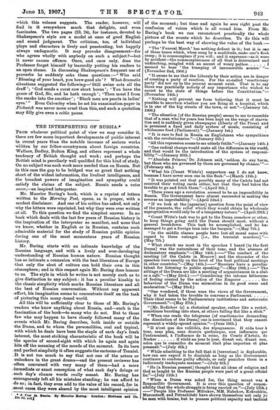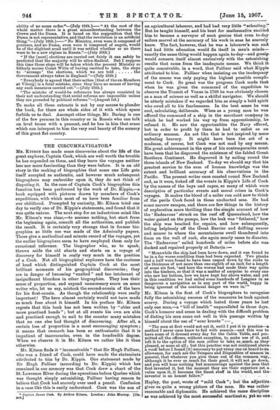• THE INTERPRETING OF RUSSIA.*
TROIS whatever political point of view we may consider it, there are few more important developments of public interest in recent years than the notable increase of serious works alitten by our fellow-countrymen about foreign countries. Wallace, Bailey, Bolton King, and others represent a whole tendency of British thought and work; and perhaps the British mind is peculiarly well qualified for this kind of study. On no subject was such work more needed than on Russia. But In this case the gap to be bridged was so great that nothing abort of the widest information, the liveliest intelligence, and the broadest powers- of imagination and sympathy could .satisfy the claims- of the subject. Russia needs a vales sacer,—an inspired interpreter.
Mr. Maurice Baring's book, which is a reprint of letters written to the Morning Post, opens, as is proper, with a modest disclaimer. And one of his critics has asked, not only -why the letters were reprinted, but why they were ever written :at alL To this question we find the simplest answer. In no book which deals with the last few years of Russian history is the inspiration of the interpreter so manifest, and none that we know, whether in English or in Russian, contains such :admirable material for the study of Russian public opinion during one of the most momentous years of Russian -history.
Mr. Baring starts with an intimate knowledge of the 'Russian language, and with a lively and ever-developing -understanding of Russian human nature. Russian thought 'has so intimate a connexion with the best literature of Europe that only the elect of culture can hold their own in this .atmospbere; and in this respect again Mr. Baring does honour to us. The style in which he writes is not merely such as to , give distinction to any subject : it has a peculiar kinship to the classic simplicity which marks Russian literature and all the best of Russian conversation. Without any apparent 'effort, his imagination seems to concentrate itself on the task of picturing this many -toned world.
All this will be sufficiently clear to those of Mr. Baring's readers who know anything about Russia, and—such is the fascination of the book—to many who do not. But to those few who may happen to have closely followed many of the -events which Mr. Baring describes, both inside or outside -the puma, and to whom the personalities, real and typical, with which he deals have been the staple of each day's fresh interest, the most striking characteristic of the book will be -the species of second-sight with which he again and again lute off the meaning of the moods of the moment. In its bare and perfect simplicity it often suggests the cartoons of TennieL , It is not too much to say that not one of the actors or onlookers in the great drama—and the present reviewer has often conversed with very many of them—had a more • immediate or exact conception of what each day's doings or each day's chance words really meant. Mr. Baring has 'courageously left all his mistakes standing; he can afford to -do so; in fact, they even add to the value of his record, for in .most cases they were shared by the most intelligent opinion
• A Yost al Runk, r arassiee flaring. London, Methuen sad 0o. ed, eft]
of the moment ; but time and again be sees right past the confusion of voices which is all round him. From Mr. Baring's book we can reconstruct practically the whole picture of the events which he describes. To do this will perhaps be the best way of showing the value of the book
" The 'Funeral March' has nothing defiant in it;- but it is one of those tunes which, when sung by a multitude, make one's flesh creep ; it is commonplace if you will ; and it expresses—as it were by accident—the commonplaceness of all that IS determined and unflinching, mingled with an accent of weary pathos seemed to hear the tramping of innumerable armies.' "- (November 2nd, 1905.) "It seems to me that the Liberals by their action are in danger of creating a party of reaction. For the so-called ' reaotionasy party' did not up to the present moment exist. That is to say there was practically nobody of any importance who wished to revert to the state of things before the Constitution,"— (November 14th.)
"Nothing will prevent me from believing that it must be possible to ascertain whether you are firing at a hospital, which is in one of the big streets of the town, or not."—(January lit, 1906.) "The situation [of the Russian people] seems to me to resemble that of a man who for years has been kept on the verge of starve- tion and is suddenly given champagne (liberty of the Press) and is- promised a fixed and daily system of meals, consisting of wholesome food (Parliament)."—(January 1st.) "It is rare to find in Russia an Englishman who sympathises with the revolutionaries."—(January 6th.) "All this repression seems to me utterly fntile."--(January 14th.) "One radical change would make all the difference in the world, and that would be the introduction of the system of, responsi- bility."—(January 20th.)
" Absolute Princes,' Dr. johnson said, 'seldom do any harm, but those who are governed by them are -governed by chitnee.'"— (February 4th.)
"What his [Count Witte's] supporters say I do not know, because I have never seen one in,the flesh."—(March 11th.) , "It was pointed out that possibly many of the Cadets had not received their voting cards either, but that they had taken the trouble to go and fetch them."—(April 8th.) "Three years ago a revolution seemed to be an impossibility in Russia. The Government have almost succeeded in making the reverse an improbability."—(April 22nd.) "If we look at the [agrarian] question from the point of view of the peasants, the relief which they would obtain by wholesale expropriation would only be of a temporary nature."—(April 29th.)
"Count Witte's task was to get to the Dams somehow or other. to keep things going Until the Dame should meet, without "a general breakdown. This task he accomplished, and he has managed to get a foreign loan into the bargain."—(May 7th.)
"In the middle classes people have lost all moral sense with regard to these outrages [i.e., the terrorist murders]."— (May 7th.)
"What struck me most in the speeches I heard [in the firat Hume] Was the naturalness of their tone, and the absence Of declamatory emphasis."—(May 14th.)—" The conduct of the meeting [of the Cadets in Moscow] and the character of the speeches were exactly on the level of the beat political meetings in other countries."—(May 14th.)—" Russians have a peculiar talent for listening to public speaking."—(May 18th.)—" The sittings of the llama are like a meeting of acquaintances inS club or a cafe."—(May 23rd.) —" Considering the intense bitterness
of feeling created by the action of the Emperor tho behaviour of the Dunn, was miraculous in its good sense and moderation."—(May 23rd.) "One wondered, if these were the views of the Government, why it had taken the trouble to convene a Parliament Their ideal seems to be Parliamentary institutions and autocratic Government."—(May 27th.) "[Mr. Rodichev is] a rhetorical speaker, rather like a rocket, sometimes bursting into stars, at others falling fiat like a stick."
"When one reads the telegrams [of reactionaries demanding the dissolution of the Dame] one is convinced that they cannot represent a widely-spread opinion."—(June 16th.)
"11 n'eut que des volleites, des repugnances. 11 cede, tour k tour, sans plan, sans dessein quelconque, aux influences qui Yentouraient, k l'influence de la reins, cla Comte d'Artois, de
Necker ii v6cfit au jour le jeer, disant oui, disant non, salon que le conseiller du moment etait plus importun at plus pressant."—(July 6th.) " While admitting to the full that it [terrorism] is deplorable, how MI one expect it to diminish as long as the Government continues to condone guilty officials, or only punishes them in a ludicrously inadequate manner."—(July 6th.) "He [a Russian peasant] thought that all ideas of religion and God as taught to the Russian people were part of a great official "When a Dams was asked for, the thing meant WAS a Responsible Government. It is over this question of respon- sibility that the whole struggle is being carried on."—(July 12th.) —"People like Professor Miliukov, MM. Nabokov, Kokoshkin, Muromtseff, and Petrazhitski have shown themselves not only .po be men with brains, but to possess political capacity and tactical ability of no mean order."—(July 19th.)—" At the root of the whole matter there is a great misunderstanding between the Crown and the Duma. It is based on the supposition that the Duma is not representative, and that the revolution is an artificial thing."—(July 190.)—" No Ministry, even were it composed of geniuses, and no Dame, even were it composed of angels, would be of the slightest avail until it was settled whether or no there were to be a new regime in Russia."—(july 25th.)
"If the [next] elections are carried out fairly it can safely be predicted that the majority will be ultra-Radical. But I suppose this time those steps will be taken which the present Ministry so bitterly accuse Count Witte of having omitted to take, the steps to 'arrange' the elections, which we are told the Government always takes in England."—(July 25th.)
" Everybody is agreed that their action [that of the ex-Members at Viborg] is a fatal mistake, since they have no means of having any such measures carried out."—(July 25th.) " The mistake of would-be reformers has always consisted in their not understanding that social reforms are impossible unless they are preceded by political reforms."—(August let.)
To make all these extracts is not by any means to plunder the book, for there are whole aides of it with which space forbids us to deal. Amongst other things, Mr. Baring is one of the few persons in this country or in Russia who can talk on level terms with a peasant, and he has in him that sense which can interpret to him the very real beauty of the scenery of this great fiat country.







































 Previous page
Previous page